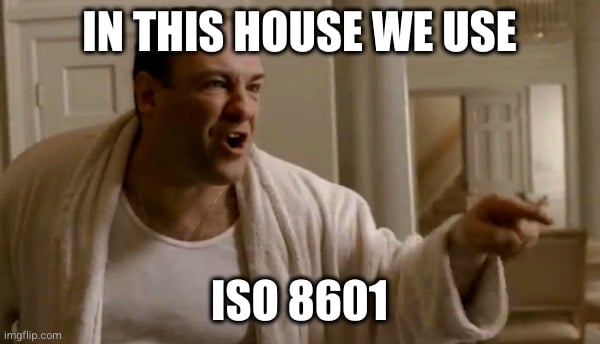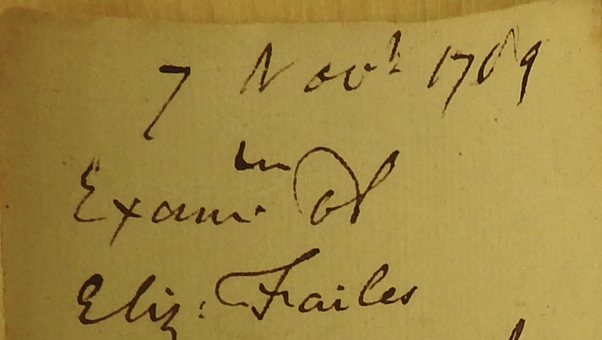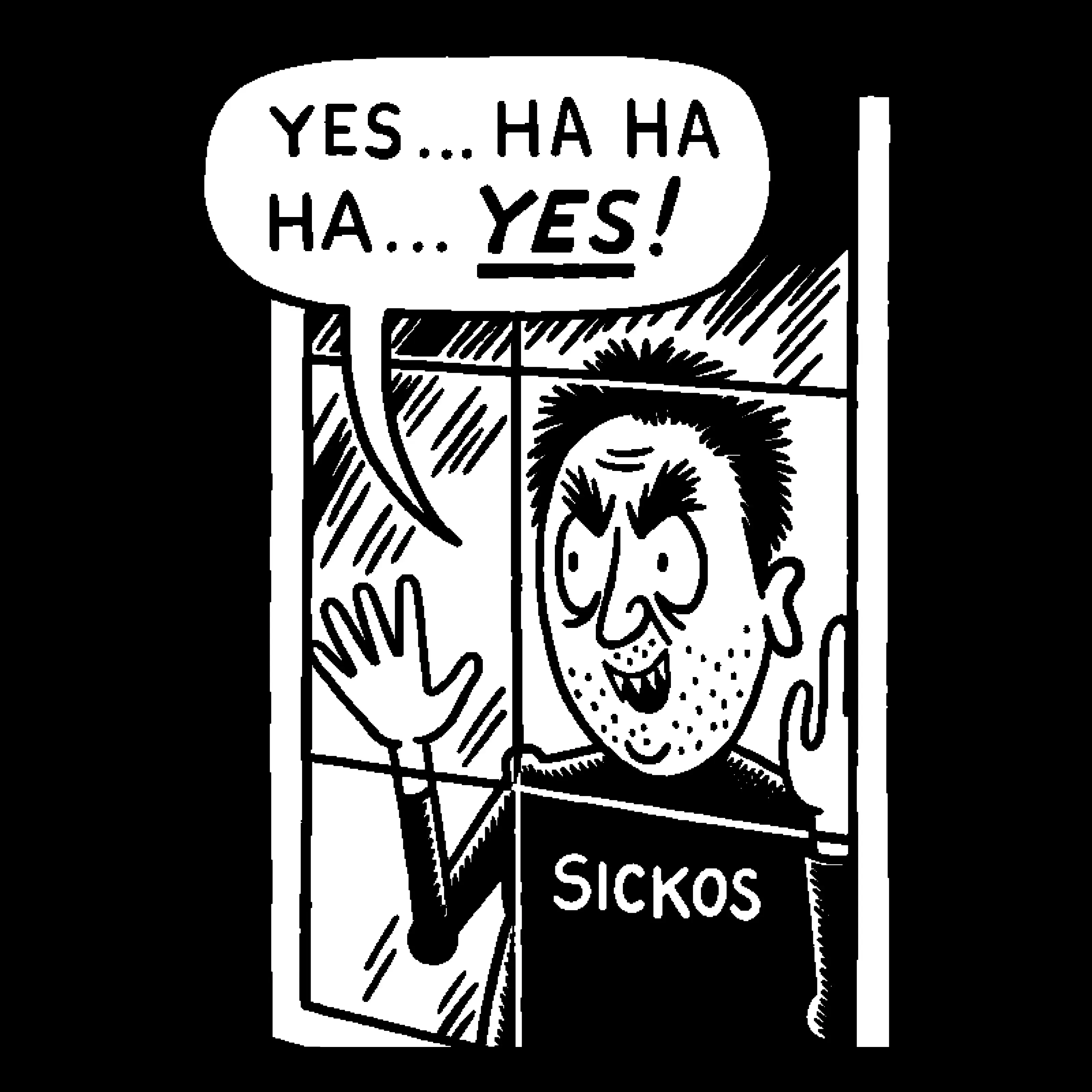- cross-posted to:
- memes@jlai.lu
- cross-posted to:
- memes@jlai.lu
Waiting for the ISO 8601 & 9001 gang to show up and promote YYYY-MM-DD.
Edit: That took seconds, a very punctual bunch.
Hello I’ve arrived
Whoo! ISO-8601 fan club!
deleted by creator
I use periods. YYYY.MM.DD
I know. I started using the format with periods back in the 90s, before I knew of the standard, and at this point doing it with periods is muscle memory. That’s not meant as an excuse, just an explanation. The excuse is laziness.
Best excuse
Same here but not in the 90s. Since discovering the standard I have switched though.
If only there were some international standards organization to make a decision for us!
deleted by creator
That’s … why I’m here
RFC 3339 if you please. Let’s be prescriptive.
After all the self-important blowhards in the committe were satisified that they had put their fingerprint on the ISO8601 document with bullshit like “year-month-week” format support and signed off, they went home.
The rest stayed behind, waited a few minutes to be safe, and then quickly made RFC3339 like a proper standard.
This is what RFC3339 vs ISO8601 feels like.
Let’s not forget that technically you have to pay for ISO8601, despite it being nearly useless as a standard because it allows several incompatible formats to coexist.
Fucking wild.
While a fucking stupid concept, it’s nice that this particular format has a monetary deterrent.
Anyone help enlighten me about whatever this and unix epoch are getting at? Are these really more specific/better than iso 8601 and why specifically?
Happily!
So, first epoch time. It’s a pretty robust standard, covers many use cases, has few edge cases… but it’s specifically for machine usage, since it’s not human readable and it’s not reversible into the past (pre-1970).
ISO 8601 (depending on the annum), by the text of the documentation, these are all valid dates:
- 2007-04-05T14:30
- 2007-04-05T12:30−02:00
- 2007-04-05T14:30Z
- 200704051430
- 07-04-05T14:30
- 2007-95T14:30
Etc.
RFC 3339 (& RFC 9557, it’s newest modification) is actually a subset of ISO 8601 and is far more prescriptive. For example you must have a timezone designator. You must have a separator between the date and time. You must use a dash between date elements and a colon between time elements. You can easily add standardized subseconds.
- 2007-04-05T12:30−02:00
- 2007-04-05 14:30Z
This means that RFC 3339 is much easier to parse and use by both machines and humans.
This page (reddit, I know…) has a great summary, and so in the interest of knowledge and attribution I’ll link it: https://www.reddit.com/r/ISO8601/comments/p572xy/rfc_3339_versus_iso_8601/
This website allows you to more directly compare the two interactively. https://ijmacd.github.io/rfc3339-iso8601/
This is delicious, and I can’t say thank you enough. I like this a lot. If anyone has any insight on more superior standards or subsets of these, please inform me. This made my day tho 😊
I’m now imagining a child who must write
2026-05-10T10:06:09.426792Zon all of their tests.They should also add a timezone since most of us don’t live at UTC zero timezones -> 2012-12-28T18:12:33+09:00
They did; the
Zat the end denotes UTC.My point was not everyone is just at UTC zero but sure Z is also a timezone.
Microsecond precision is fine for most use cases, but I teach my kids to use nanoseconds.
It’s a flexible standard.
2026-05-10T10:06:09.426792Z,2026-05-10 10:06:09.426792Z,2026-05-10 10:06:09.426792, and2026-05-10all conform to the standard.
I’m doing my part!
ISO 8601/RFC-3339 (Unix Epoch also acceptable) gang reporting in.
ISO thirsty!

deleted by creator
It’s the only way that makes sense
Hello from Hungary ! We should also democratize the Surname GivenName format
Szia. We should indeed.
o7
YYYY-MM-… well, ya know the deal…
Anyone that gives me a document or receipt or invoice with a date formatted DD-MM-YYYY should have a tire iron swung at their thighs
Multiple swings if they can’t decide on using DD-MM-YYYY or MM-DD-YYYY or DD-MM-YY or MM-DD-YY or YY-MM-DD or YY-DD-MM
As a big ISO 8601 guy myself, I request explanation of this 9001 addition? Never heard of it till now and am optimistic
Quality Management Systems, unsure what it has to do with 8601, but guess the fanboy venn diagram overlaps
Seconded. Not coming up with much when trying to find out more about it.
sup
DD-MM-YYYY-HH-MM-SS
Makes no sense!
This fucknuts who thinks day should come before year, hah! Give me YYYY-MM-DD, because dashes are better than slashes any day of the week.
This format is the best. Especially for digital file names, because sorting the files by filename also sorts them by date.
A true professional. Have an upvote.
I prefer YYYY.MM.DD, because the dots look aesthetically pleasing when the date is being displayed within the vincity of a clock displaying the time digitally.
When i first read a date, i want to see the thing that changes 74 times in my entire life first too
ISO 8601 gang.
Represent.
YYYY-MM-DD if you’re doing backup naming, easier to find
Yup, versioned files ALWAYS get a YYYY-MM-DD HHMM timestamp. So when you sort alphabetically, they sort chronologically.
“Apologies, Jason. It’s you & not me.
You’re just the opposite of the man I could ever want to spend the rest of my years with.”
Wrong, not for windows. 1<5<10 there.
That’s why you always have the same number of digits. 01 < 05 < 10
Or you’re Canadian
My time abroad has taught me that YYYY/MM/DD is the way to format dates.
thank you for spreading the good word
My time using a computer and trying to have any semblance of organization has taught me the same
my man!
its really the only option if you’re using it for things like file storage.
YYYYMMDDHHMMSS is the only acceptable format.
ISO 8601 is clearly much superior due to being delimited.
ISO is paywalled therefore inferior than the free RFC.
Nope, it clearly should be mmsshhMMDDYYYY
For consistency, Americans should adopt mm:ss.hh MM-DD-YYYY.
For consistency, Europeans should adopt ss:mm:hh DD-MM-YYYY.
See how ridiculous that is? ISO8601 or GTFO
The european one is sorted based on importance to see. The day is more important than the month which is more important than the year. The hour is more important than the minute which is more important than the second
But in any given situation where the month is important enough that I need to know it, I want to know the month regardless of the day. The 25th means fuck all to me unless I know the month, as well; whereas there are plenty of scenarios where I want to know the month but the day isn’t quite as important.
Usually if someone just says the 25th that means of the current month. The month only needs to be referred to if it’s not the same as the current. (In conversation)
In that case, nothing is stopping you from saying the month only.
The same thing happens to the year and day too
January means nothing if you dont know the year
At least ss:mm:hh and DD-MM-YYYY are internally consistent, even if they aren’t consistent with each other.
MM-DD-YYYY isn’t even internally consistent.
You monster
Nah they should adopt metric time and nothing else.
If you use DD/MM/YYYY then logically you should also use ss:mm:hh
SMH…
Sarcastically Shaking My Many Hydra Heads.
This is probably the best comment I have seen all year.
No, because in most cases the most important information about a date is the day, then month, then year. It also matches the way we read dates. For the time it’s typically the hour, then minutes, then seconds. YYYY/MM/DD is better when naming files, but in UIs I much prefer DD/MM/YYYY, it’s just more natural to the way we read.
deleted by creator
Don’t go with this psycho! He mixes European style order with US style punctuation.
Standard in Australia. And common in the UK (it’s traditionally a dot, but slash is more common now).
But I’m team ISO-8601 when there’s a chance of an international audience. At least where locale information can’t be used.
US style punctation?
I mean slashes
/instead of colons.Talking of colons, both of those “formats” are pulled from one
That’s not a colon. Both are commonly in use in Europe. USA just switched the d/m
Is it really switching if that was the way it was traditionally done and they just kept doing it that way?
I think it was primarily a verbal ordering, that later became commonplace written down in the US. If it was written down in that order elsewhere, it would have been with the full text, ie. “July 4th, 1776”. Never something like “07/04/1776”, which I believe was an American invention.
But wouldn’t that just be an extension of the way of doing things, though? If I’m used to writing “July 4th, 1776”, I wouldn’t start writing “04/07/1776” when that format picked up (which, as I understand things, didn’t really become a widespread norm until computers).
Unless I’m misunderstanding you, of course (always possible).
I think written abbreviated it was always eg. 4 Jul 1776, 4.7.1776 in Europe (UK/France/Germany)

Ohh
common in Belgium, probably other countries too
This is stupid AF.
YYYY/MM/DD
This is the best choice.
/isn’t a valid char in filenames, yyyy-mm-dd is betterIts the better choice for digital data I guess. In every day use, the day is the most important thing, then month, then year.
From context, I usually know the year. Probably even the month. So I’ll use DD.MM.YYYY. If someone asks me when we’re going to meet I won’t say “twenty-twentyfive”, June, twentieth. And I’m guessing you don’t do that either.
Heretic!
YYYY.MM.DD is the correct format.
small correction: YYYY-MM-DD to avoid common special meanings chars
For computing or sorting purposes, YYYY-MM-DD is best. But in day to day writing a date, I prefer DD-MON-YYYY.
11-006-2025 ?
11-Jun-2025
It’s shit format but at least it’s better than 11.6.2025 or 6/11/2025
11-Jun-2025
Single letter for month is too ambiguous - how do you tell apart June, July and January? Also, what do O and N denote?
Seems you missed the point, it’s first three letters of the month, not one. Edit: seems I missed the joke on the post.
The O is for the kind of whooshing sound
I see it now FML. Editing my comment.
In your defense, it’s usually denoted MMM.
What if the day in question isn’t a Monday?
I’m sorry that you’re wrong… What a bummer.
Excuse me but !iso8601@lemmy.sdf.org .
That’s a tough one. I would have to say April 25. Because it’s not too hot, not too cold, all you need is a light jacket.
I’m the only one annoyed about DD/MM/YYYY not being a date, but a date “format”?
Not only it’s a recycled joke, it doesn’t even make sense.
DD/MM/YYYY or YYYY-MM-DD are formatting conventions for expressing dates. The date itself is probably converted from some date object anyway, like the Unix Epoch, and can be expressed in any variety of formats.Wednesday, June 11, 2025 is a date.dddd, mmm dd, yyyyor%A, %B %d, %Yis a format.Edit: I’m pretty sure I misread the comment above.






















